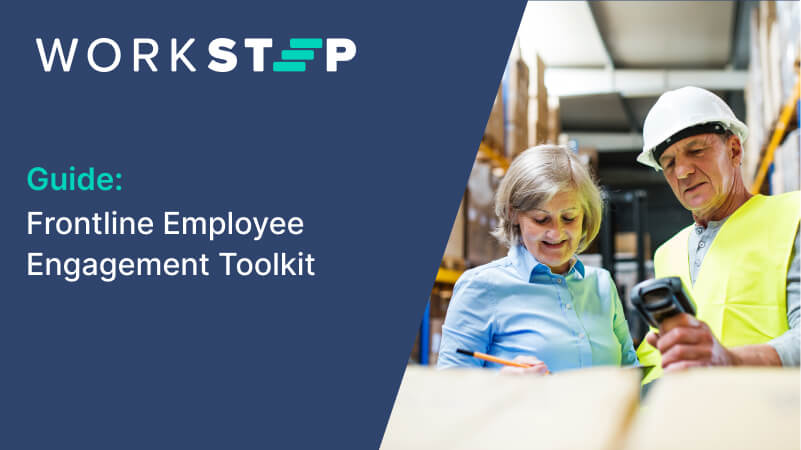On-demand webinar: Collaborative employee engagement strategies for HR & Ops leaders
June 1, 2023
Any good employee engagement strategy requires input from both HR & Operations leaders, but that partnership isn’t always easy to build. From gaining Operations buy-in, to shared accountability to operationalizing impactful action, it can be challenging to know where and how to start.
So, in May 2023 we brought together two seasoned practitioners, Stefanie Groff, WorkStep Champion and industry expert with experience at NFI and Misfits Market, and Claudia Camarillo, Sr. Director of Human Resources at Ajinomoto Foods North America, Inc., who have successfully cultivated meaningful relationships with Operations and created employee engagement initiatives that are tied to business outcomes.
Led by WorkStep’s own Tiffany Tan, we broke down:
- How to tie employee engagement to retention, turnover, and productivity.
- How to partner with Operations leaders effectively
- How to encourage action through insight
Attendees had the opportunity to participate in the live Q&A session and ask their burning questions to our expert speakers. As promised, here is our follow up to the question that was asked and every question we didn’t have the time to answer!
Watch on-demand:
Live Q&A follow up:
Share a bit about the journey to employee engagement and the importance of employee listening and feedback?
We believe that engaged employees are more productive, committed, and satisfied, leading to improved business outcomes. Over time, our thinking on this topic has evolved to recognize the significance of employee listening and feedback. We’ve come to understand that employees are the best source of insights about their own experiences, and their feedback provides valuable information for enhancing the workplace environment and addressing their needs.
Can you share a little more about the Importance of employee engagement in today’s market, in a post-covid world?
In today’s market, especially in a post-COVID world, employee engagement is more crucial than ever. The pandemic has brought significant disruptions and challenges to the workforce, such as supply chain issues, layoffs, and uncertainty. Engaged employees are more resilient, adaptable, and motivated to contribute their best efforts, even in the face of these challenges. Prioritizing employee engagement helps organizations maintain a positive work culture, retain top talent, and foster innovation and growth.
How is post-pandemic engagement and retention different from pre-pandemic?
Post-pandemic engagement and retention differ from the pre-pandemic era in several ways. Employees’ expectations regarding flexibility, work-life balance, and well-being have increased. Organizations must adapt their engagement strategies to provide adequate support and foster a sense of belonging. Additionally, there may be heightened concerns around health and safety, job security, and career growth. Addressing these evolving needs is crucial to maintain high levels of engagement and retention.
What types of challenges are you seeing today? Shifting demographics? Shifting employee expectations? Shifting employee concerns?
Today’s challenges include shifting demographics, with younger generations entering the workforce with different expectations and values. There is also a growing emphasis on diversity, equity, and inclusion, requiring organizations to create an inclusive environment that values all employees. Moreover, employees have heightened concerns about mental health support, work-life integration, and the impact of automation on job security. HR and Ops leaders must address these challenges to ensure sustained engagement.
How important is Ops partnership in your employee engagement and listening strategy?
Ops partnership is crucial in an effective employee engagement and listening strategy. Ops leaders have a deep understanding of the day-to-day operations, workflows, and challenges faced by employees. Their collaboration helps in aligning engagement efforts with operational realities, implementing changes effectively, and prioritizing actions that have the greatest impact on employee experience.
How do you get Ops buy-in that employee engagement and feedback matters?
To get Ops buy-in for engagement and feedback initiatives, it’s essential to demonstrate the tangible benefits to the organization. This includes highlighting the correlation between engagement and productivity, employee retention, customer satisfaction, and overall business success. Sharing success stories from other organizations and showcasing the ROI of engagement efforts can help secure Ops buy-in.
How do you build a relationship of trust and accountability with your Ops partners? What challenges have you faced?
Building a relationship of trust and accountability with Ops partners requires clear communication, shared goals, and regular collaboration.Ensure transparency in decision-making processes, provide Ops leaders with opportunities to provide input and feedback, and actively involve them in designing and implementing engagement initiatives. Regular check-ins, feedback loops, and recognizing their contributions foster trust and accountability.
How do you prepare your Ops leaders to listen and receive employee feedback?
To prepare Ops leaders to listen and receive feedback, provide training on active listening, empathetic communication, and creating a psychologically safe environment. Emphasize the importance of open-mindedness, constructive feedback, and the role of Ops in this process.
How do you move from feedback to action? How are you closing the loop with your employees today?
Moving from feedback to action is crucial to demonstrate that employees’ voices are heard and valued. After collecting feedback, analyze the data to identify patterns, trends, and areas for improvement. Collaborate with relevant stakeholders, including Ops leaders, to develop action plans. Clear goals and timelines are established, and progress is regularly communicated to employees. By closing the loop, employees understand that their feedback has led to tangible changes, fostering a sense of ownership and trust in the process.
How can HR leaders use data and insights to take target action?
HR leaders can leverage data and insights to drive targeted action. By analyzing employee feedback, demographic information, and engagement metrics, HR can identify specific areas of concern or opportunity. This data-driven approach helps prioritize initiatives that address the most critical needs of employees. Additionally, HR leaders can track the impact of implemented actions through ongoing data collection, ensuring continuous improvement based on real-time insights.
What types of initiatives have you been able to implement as a result of real-time feedback from employees?
Real-time feedback from employees provides valuable insights for implementing initiatives that directly address their concerns. For example, if feedback highlights the need for better work-life balance, HR can introduce flexible scheduling options or remote work policies for applicable positions. If employees express the desire for more professional development opportunities, HR can invest in training programs or mentorship initiatives. By leveraging real-time feedback, HR can tailor initiatives to meet employees’ evolving needs and expectations.
Tom Goyette, Product Marketing Manager | tom.goyette@workstep.com
Tom Goyette is a Product Marketing Manager at WorkStep. With experience in start-up and enterprise level SaaS and eCommerce organizations, Tom excels at managing and creating content, marketing, and analytics. Tom believes people are at the center of every great organization and is eager to share stories that highlights the value of the employee voice.



